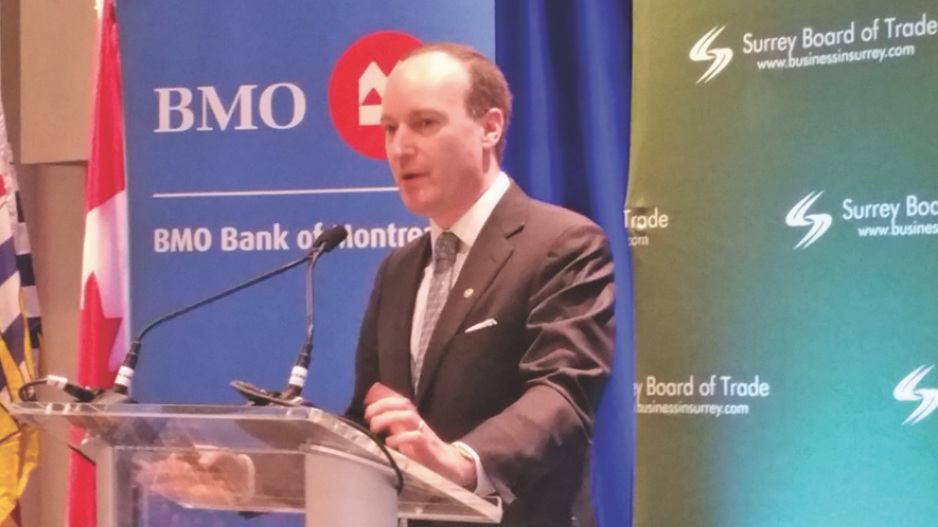At a time when Canadians’ growing debt-to-income ratios are triggering dire financial warnings, one of Canada’s top economists came to Surrey bearing good news yesterday.
“Surrey has a lot of things going well for it right now, with its population increase, location close to the border and affordability in terms of real estate,” said Douglas Porter, chief economist and managing director for BMO Capital Markets. Porter spoke February 5 at a Surrey Board of Trade luncheon at the Sheraton Guildford, the same day a report from the McKinsey Global Institute pegged Canada as one of eight countries – the others are Australia, Denmark, Sweden, the Netherlands, Malaysia, South Korea and Thailand – in which household debt-to-income ratios have surpassed pre-2008 economic downturn levels.
However, Porter is forecasting a relatively strong year for the Fraser Valley, especially the region’s real estate sector. He said as low oil prices continue to cripple the economies of Alberta, Saskatchewan and Newfoundland, migrant workers will leave those provinces looking for other opportunities and new places to live.
Porter and his BMO team are forecasting a 2.6% real gross domestic product (GDP) growth rate for B.C. this year, with 2.4% expected in 2016. B.C.’s economy is projected to lead the country in real GDP growth as well, even beating out Ontario (2.5% in 2015). Gerard Bremault, the Surrey Board of Trade’s chair, said he’s encouraged by Porter’s forecasting, though he’s mindful of other external economic factors.
“I hear a kind of consistent messaging from economists around B.C.’s relatively positive situation, and I’m not an economist by training to second-guess that. At the same time I look at the relatively large scale of Ontario, and the massively large scale of the United States and of China. And I’m just cautious about how large the scale of those economies are and the impact they could have on B.C.’s economy.”
Porter compared Surrey’s exponential growth to that of his hometown of Mississauga, Ontario. Located west of Toronto along Lake Ontario, the city grew by 6.7% from 2006 to 2011, well above the Ontario average (5.7%) and the national average (5.9%). Once a sleepy bedroom community, Mississauga is now a major metropolitan hub that offers affordable real estate alternatives to Toronto’s pricey property market. Porter sees the same story unfolding in Surrey.
“All the fundamentals are there for Surrey to benefit from Vancouver. I tend to look at cities more in terms of metro areas, and Surrey would be an excellent example of that.”
At the start of the luncheon the Surrey Board of Trade announced it is officially supporting a yes vote in the upcoming transit plebiscite that begins with mail-out ballots in March. Porter said Surrey’s growth hinges on a yes vote going forward.
“Infrastructure is huge, I think the infrastructure has to keep up with the growth, and we heard about transportation here and that’s a big one for Surrey in particular. There’s a question of whether you fumble or run with that chance. And I think a lot of people are looking at Surrey right now in regards to that.”




